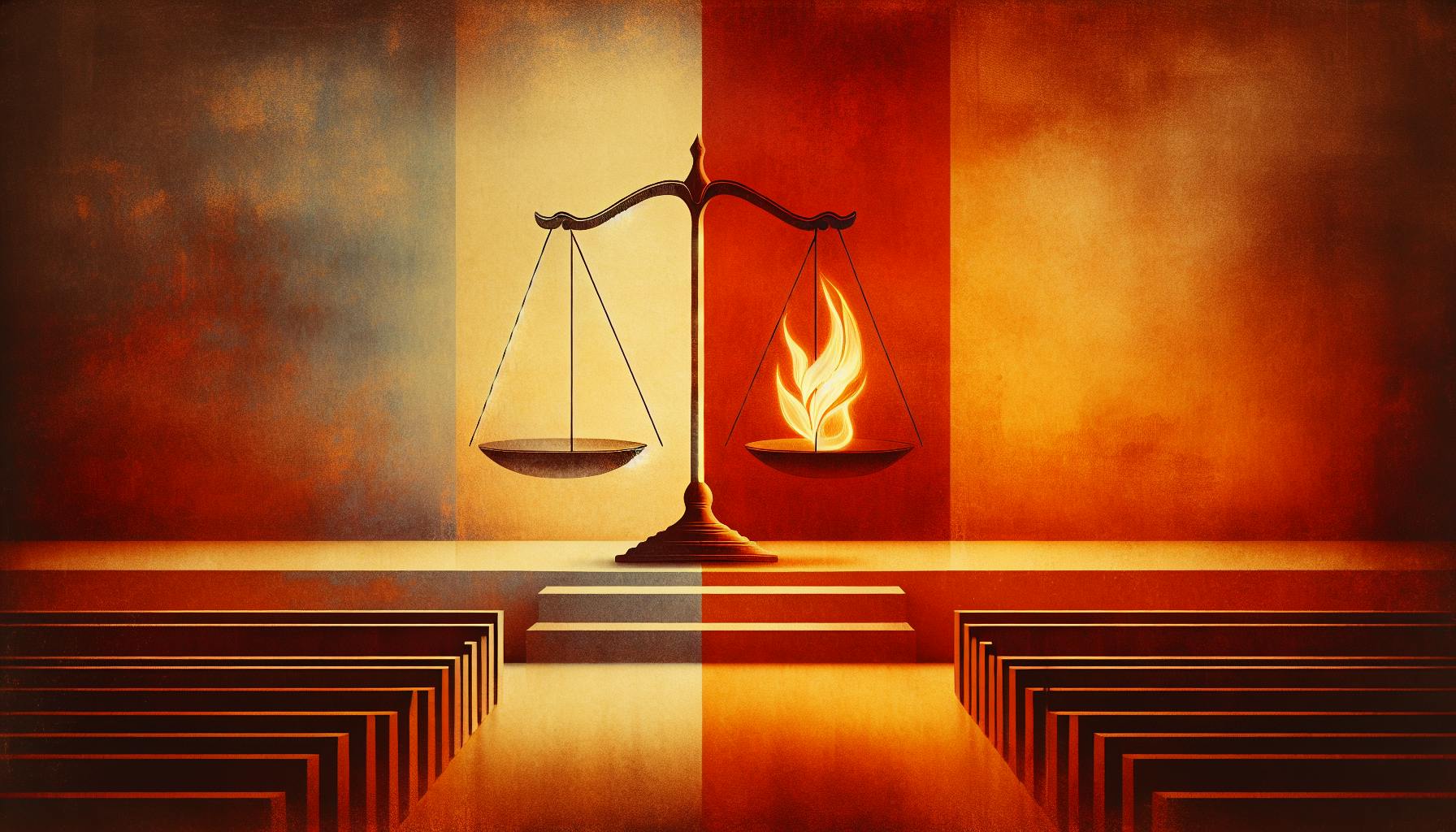Most can agree that presidential impeachment is an extraordinarily rare and impactful event.
The impeachment trial of President Andrew Johnson in 1868 was a pivotal moment that ultimately shaped the future of the American presidency.
This article will chronicle the key events, figures, and political tensions leading up to Johnson's impeachment, provide an account of the remarkable Senate trial itself, and analyze the significant legacy left by one of only three presidential impeachment proceedings in U.S. history.
Introduction to the Impeachment Trials of Andrew Johnson
Andrew Johnson's impeachment marked the first time in history that impeachment proceedings were brought against a sitting U.S. president. The trials shone a spotlight on the political divisions during Reconstruction and tested the strength of the Constitution's checks and balances. This section provides an overview of the key events and figures involved.
Andrew Johnson: The First President Impeached
Andrew Johnson ascended to the presidency after Abraham Lincoln's assassination in 1865. As a Southern Democrat, Johnson clashed with the Republican-controlled Congress over Reconstruction policies. Tensions culminated in 1868 when the House of Representatives voted to impeach Johnson on 11 articles, mainly concerning his removal of Secretary of War Edwin Stanton.
The Political Landscape Post-Civil War
During Reconstruction, Johnson repeatedly vetoed bills passed by the Radical Republicans in Congress seeking to protect newly freed slaves. Johnson favored a more lenient approach toward the South. This set the stage for his impeachment along stark political lines.
Key Events Preceding the Impeachment
- 1865: Andrew Johnson becomes president after Lincoln's assassination
- 1866: Johnson vetoes Civil Rights Act and Republicans gain control of Congress
- 1867: Congress passes Tenure of Office Act over Johnson's veto
- 1868: Johnson dismisses Stanton as Secretary of War, violating the Tenure of Office Act
- Feb. 24, 1868: Johnson impeached by the House on 11 articles
This timeline underscores the rising tensions between Johnson and Congress that resulted in his impeachment trials.
What happened during Andrew Johnson's presidency?
Andrew Johnson became president after Abraham Lincoln's assassination in 1865. He implemented his own form of Presidential Reconstruction, which included:
- Issuing proclamations directing Southern states to hold conventions and elections to re-establish their civil governments after the Civil War.
- However, his plans did not provide protection for former slaves.
- This brought him into conflict with the Republican-dominated Congress, which wanted to pass legislation to guarantee civil rights for freed slaves.
Some key events that happened during Johnson's presidency relating to Reconstruction efforts:
- Johnson issued proclamations of general amnesty for most former Confederates and instructed states to hold constitutional conventions.
- Southern states enacted "Black Codes" to restrict rights of former slaves. Johnson did little to protect freedmen.
- Congress refused to seat representatives from Southern states and passed the Civil Rights Act of 1866 over Johnson's veto.
- Johnson continued to oppose Congressional Reconstruction efforts. Congress responded by passing the Tenure of Office Act in 1867.
- Conflict between Johnson and Congress led to his impeachment in 1868, though he was acquitted in the Senate trial.
In summary, Johnson favored a more lenient policy toward Southern states, leading to repeated clashes with Congress that wanted to take a harder line on protecting civil rights. His impeachment was a result of these tensions over Reconstruction policy.
What led to Andrew Johnson's impeachment quizlet?
President Johnson was impeached in 1868 because he violated the Tenure of Office Act by removing Secretary of War Edwin Stanton from office without the consent of Congress.
The Tenure of Office Act was passed by Congress in 1867 over Johnson's veto. It restricted the president's ability to remove certain office holders that required Senate approval without the Senate's agreement. Johnson ignored this law by removing Stanton, which led the House of Representatives to approve 11 articles of impeachment against him.
The key reasons behind Johnson's impeachment were:
-
Johnson's dismissal of Stanton violated the Tenure of Office Act, which Congress had passed to limit his powers. Many members of Congress saw this as an abuse of power.
-
The House felt Johnson had brought disgrace to the presidency through his opposition to Congressional Reconstruction policies aimed at assisting former slaves and punishing former Confederate leaders after the Civil War.
-
Radical Republicans in Congress were furious at Johnson's lenient policies towards the South. Impeaching him was a political move to limit his ability to block their Reconstruction plans.
Ultimately, Johnson was spared removal from office by a single vote in the Senate, avoiding conviction by the slimmest of margins. But the impeachment left Johnson politically crippled and unable to stop the Radical Republicans' Reconstruction vision in his final months in office.
What were Andrew Johnson's plans for reconstruction?
President Andrew Johnson's plan for Reconstruction after the Civil War focused on quickly bringing the former Confederate states back into the Union. The key elements of his plan included:
-
Granting amnesty and restoring property rights to former Confederates who pledged loyalty to the Union. However, there were some exceptions made for high-ranking Confederate government and military leaders.
-
Requiring Confederate states to nullify their acts of secession, swear allegiance to the Union, and ratify the 13th Amendment which abolished slavery.
-
Confederate states would be readmitted to the Union once 10% of their 1860 voting population had sworn loyalty to the Union.
-
States would be required to uphold existing federal laws and protect freedmen's civil rights. However, the actual implementation and enforcement of these rights was left largely up to the states.
-
The Confederate states had to repudiate their war debts, which Johnson felt should not be held against the federal government.
Johnson took a more lenient approach towards the South than the Radical Republicans in Congress, who wanted stricter terms imposed on Confederate states before readmission. As a result, Johnson clashed frequently with Congress over Reconstruction policies.
Has a president ever been removed from office?
To date, no president impeached by the House of Representatives has ever been removed from office by the Senate.
The impeachment trial of President Andrew Johnson in 1868 came the closest to resulting in removal. Johnson was impeached by the House on 11 articles related to violating the Tenure of Office Act when he removed Secretary of War Edwin Stanton from office.
The trial was held in the Senate, with Chief Justice Salmon P. Chase presiding. A two-thirds majority was required to convict and remove Johnson from office. The Senate took three separate votes on the 11 impeachment articles, and each fell short of the necessary two-thirds majority, allowing Johnson to remain in office despite his impeachment.
The vote margins were narrow on some of the articles, but ultimately not enough to reach the supermajority threshold. While the impeachment effort was unsuccessful in removing Johnson, the process revealed the power Congress has to check the executive branch under the Constitution.
So in American history, impeachment has never resulted directly in the removal of a president. However, the threat alone serves as an important check on presidential abuse of power.
sbb-itb-e93bf99
sbb-itb-e93bf99
sbb-itb-e93bf99
The Path to Impeachment: Conflict and Controversy
This section explores the escalating tensions between President Andrew Johnson and the Radical Republicans in Congress, culminating in Johnson's impeachment in 1868.
The Radical Republicans vs. Andrew Johnson
The Radical Republicans in Congress were committed to aggressively pursuing civil rights for freed slaves and punishing the South during Reconstruction after the Civil War. They clashed with President Andrew Johnson over these policies.
Johnson favored a more lenient approach to Reconstruction that allowed Southern states to rejoin the Union quickly. He also opposed giving freed slaves voting rights. This angered the Radical Republicans, who saw Johnson as an obstacle to securing racial equality and justice in the South.
Over time, the ideological battles between Johnson and the Radical Republicans became increasingly heated. The Radicals pushed civil rights legislation and other Reconstruction policies, which Johnson repeatedly vetoed. This mounting conflict set the stage for an impeachment crisis.
The Tenure of Office Act: A Legal Pretext for Impeachment
In March 1867, Congress passed the Tenure of Office Act over Johnson's veto. This law restricted the president's power to remove federal office holders without Senate approval. It was specifically designed to shield Secretary of War Edwin Stanton, who the Radical Republicans wanted to keep in office.
The Tenure of Office Act gave the House a potential legal justification to impeach Johnson if he removed Stanton. Johnson considered the law unconstitutional, setting up a legal showdown. When he eventually suspended Stanton in the summer of 1867, it became a trigger for impeachment.
Edwin Stanton's Dismissal and the Impeachment Inquiry
The final spark for impeachment came when Johnson dismissed Secretary of War Edwin Stanton in February 1868 without the Senate's approval. This was seen as a clear violation of the Tenure of Office Act.
In response, the House voted overwhelmingly to impeach Johnson for high crimes and misdemeanors. A committee drew up formal charges against him focusing on the dismissal of Stanton and alleging Johnson violated the Constitution.
After a two-month trial, the Senate acquitted Johnson by a single vote. While he remained in office, his power was greatly diminished. The failed impeachment left Johnson a lame duck president but spared him the ignominy of being removed from office.
The Impeachment Proceedings in the House of Representatives
The impeachment proceedings against President Andrew Johnson formally began in the United States House of Representatives in early 1868. The Radical Republicans who controlled Congress at the time initiated the process due to their opposition to Johnson's lenient policies towards the Southern states following the Civil War.
The House's Impeachment Resolution
On February 24, 1868, the House of Representatives voted 126 to 47 to impeach President Andrew Johnson. This vote set in motion formal impeachment proceedings against Johnson for "high crimes and misdemeanors" as outlined in the Constitution.
The impeachment resolution brought 11 articles of impeachment against Johnson. The charges related to Johnson's removal of Secretary of War Edwin Stanton and violation of the Tenure of Office Act. This Act was passed by Congress the previous year to prevent Johnson from removing cabinet members without the Senate's approval.
Adoption of the Eleven Articles of Impeachment
In early March 1868, after extensive debate, the House adopted all 11 articles of impeachment against President Johnson. The articles alleged that Johnson had exceeded the power of his office and failed to respect the authority of Congress.
Specifically, the articles focused on Johnson's defiance of the Tenure of Office Act by removing Stanton as Secretary of War. Johnson believed the Act was unconstitutional. However, the House determined that his actions were unlawful.
The adoption of the articles set in motion the next stage - the impeachment trial in the Senate.
The Role of the House Managers in the Impeachment Trials
With the articles adopted, the House next had to organize the evidence against Johnson and present their case to the Senate.
To lead this process, they appointed a team of 7 "House managers." Their role was similar to prosecutors - arguing the case before the Senate and demonstrating that Johnson's actions met the constitutional grounds for impeachment.
The House managers outlined Johnson's offenses and provided evidence from witness testimony, documents, and past precedents. They worked extensively to convince the Senate that Johnson deserved to be removed from office over his defiance of Congress.
The Federal Impeachment Trial in the United States Senate
The impeachment trial of President Andrew Johnson was conducted in the United States Senate chamber in 1868. As outlined in the Constitution, the Senate took on a judicial role to determine if the President should be removed from office based on the articles of impeachment brought by the House of Representatives.
The Senate Chamber as a Courtroom
The Senate chamber was transformed into a courtroom for the impeachment trial proceedings. As mandated by the Constitution, the Chief Justice of the Supreme Court, Salmon P. Chase, presided over the trial. The 100 Senators became the jury, taking a special oath to "do impartial justice according to the Constitution and laws". The House impeachment managers acted as the prosecutors making the case against the president.
Testimonies and Evidence Presented
Over the course of the trial, the impeachment managers provided testimony from dozens of witnesses and introduced hundreds of exhibits and documents as evidence that President Johnson had violated laws like the Tenure of Office Act. Johnson's defense team refuted the charges and evidence. In the end, not enough Senators were convinced that Johnson committed "high crimes and misdemeanors" worthy of removal from office.
The Impeachment Trial of Andrew Johnson: An Account
The key moments of Johnson's impeachment trial included the opening arguments, witness testimonies, dramatic confrontations between the impeachment managers and defense team, behind-the-scenes political maneuvering, and the final suspenseful roll call vote. Despite the House managers building a strong case against Johnson, his acquittal was all but certain as more Senators began opposing conviction as the trial progressed.
The Roll Call Vote on May 16, 1868
The roll call vote on May 16, 1868 to determine whether President Andrew Johnson should be removed from office was filled with drama and tension. Ultimately, with a vote of 35 guilty to 19 not guilty, the effort to impeach Johnson failed by a single vote short of the two-thirds majority required by the Constitution. Though not removed, Johnson was politically weakened and his presidency never recovered from the impeachment trial.
The Outcome and Legacy of Andrew Johnson's Impeachment
Andrew Johnson's Narrow Escape from Removal
Andrew Johnson narrowly avoided conviction and removal from office, with the Senate vote falling one vote short of the required two-thirds supermajority. While he remained president, his power and influence were greatly diminished. He was denied the Democratic party nomination for the 1868 election.
Johnson's impeachment left a lasting mark on the presidency and the federal government. Though he finished his term, Johnson was significantly weakened politically. His clashes with Congress over Reconstruction policy continued, but with little ability to prevail.
Impact on Reconstruction and Presidential Authority
The impeachment crisis showed the limits of presidential power against an assertive Congress, at least regarding domestic policy. In the aftermath, Congressional Republicans pressed forward aggressively with plans for Reconstruction in the South. They enacted measures over Johnson's opposition or vetoes.
However, the Senate's refusal to convict established that impeachment would not be a routine tool for Congress to remove presidents over policy disagreements. The bar for removal remained high - reserved for severe abuses of power or unfitness for office.
Historical Comparisons: Impeachment Trials from Johnson to Trump
Johnson's impeachment stood alone in American history for over a century as the only serious effort to remove a president. Calls for impeachment arose against other 20th century presidents like Hoover, Truman and Reagan, but never reached the formal inquiry stage.
Bill Clinton and Donald Trump later joined Johnson as the only presidents to be impeached. But like Johnson, both were acquitted in Senate trials and served out their terms. The repeated pattern of failed convictions highlights the inherent difficulty of marshaling a two-thirds Senate supermajority for removal.
Reflections in Historical Literature and Media
Johnson's impeachment has been extensively examined by historians seeking to evaluate his controversial presidency in the aftermath of Lincoln's assassination. Johnson is commonly ranked among the nation's least effective presidents.
Yet among scholars, there are debates on whether Johnson deserved removal given the vague Constitutional standards. PBS's 2002 documentary "The Presidents" called his acquittal "the greatest victory in the life of Andrew Johnson." The impeachment is widely seen as a reflection of the fierce ideological clashes over Reconstruction policy as much as due to Johnson's own conduct.
Conclusion: The Enduring Significance of the Impeachment Trials of President Andrew Johnson
The impeachment trials of President Andrew Johnson were a pivotal moment in American history that illustrated the inherent tensions between Congress and the presidency. Though Johnson was ultimately acquitted, the proceedings established crucial precedents regarding impeachment and executive power.
Lessons Learned from the Impeachment of Andrew Johnson
The impeachment of Andrew Johnson imparted several key lessons:
-
Impeachment should not be pursued lightly or for purely political reasons. The House managers struggled to build a convincing legal case against Johnson.
-
Defining "high crimes and misdemeanors" remains challenging. Disagreements over this constitutional phrase were central to Johnson's trials.
-
Bipartisanship is important for presidential impeachments. The extreme partisanship in Johnson's case undermined perceptions of legitimacy.
Overall, the Johnson impeachment trials highlighted the gravity of overturning a presidential election via impeachment. This helped shape the cautious approach taken in later presidential impeachments.
The Impeachment's Role in Shaping the Future of the Presidency
The impeachment also influenced the balance of power between the legislative and executive branches moving forward:
-
It demonstrated Congress's oversight authority over the president. This set an important precedent even though Johnson stayed in office.
-
The trials helped define discretionary presidential powers like removing cabinet members. This still shapes executive power today.
-
The impeachment effort revealed limits on presidential impunity. This likely deterred later presidents from completely ignoring Congress.
Thus, while Johnson was not removed, the impeachment left an enduring mark on the presidency that continues to influence inter-branch relations.


